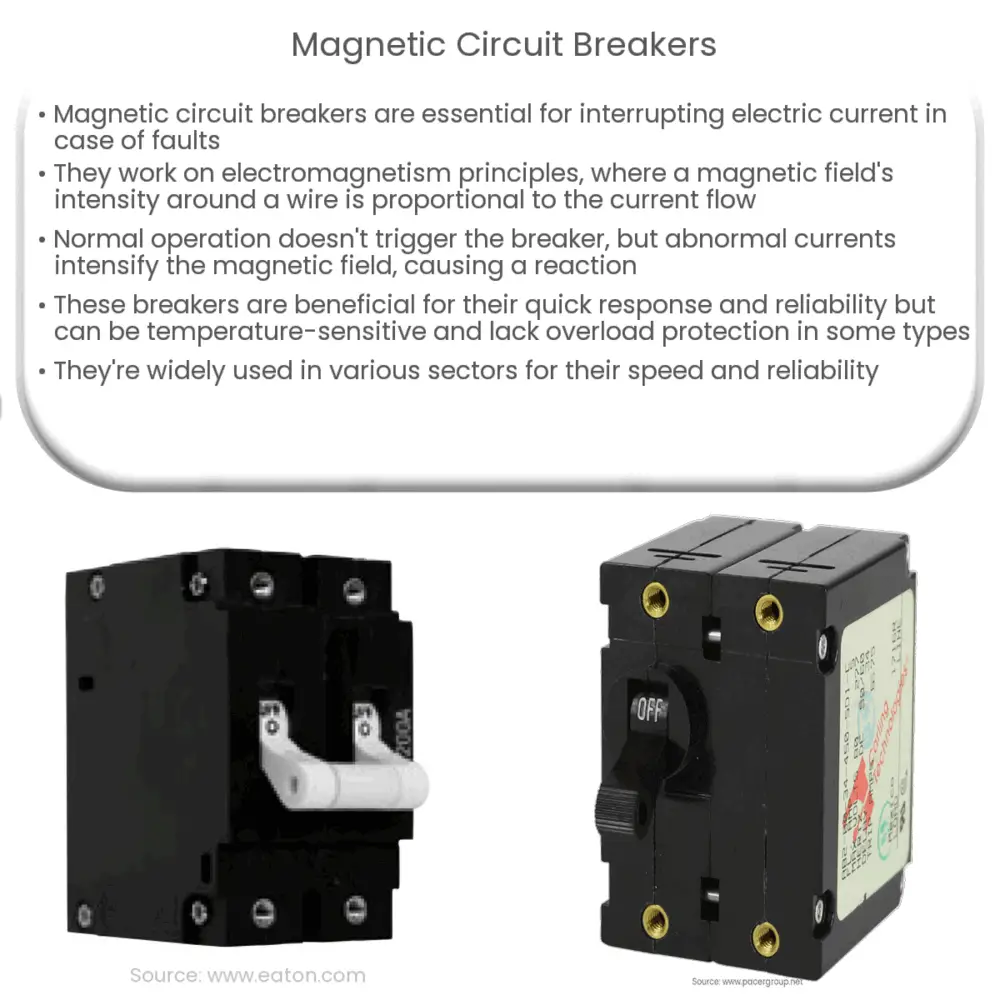Explore the workings, types, benefits, drawbacks, and applications of magnetic circuit breakers in our comprehensive guide.

Understanding Magnetic Circuit Breakers
A circuit breaker is an essential component in any electrical system. Its primary function is to interrupt the flow of electric current when a fault is detected, thereby preventing electrical fires, shocks, or other damage. Among the several types of circuit breakers available, one of the most common is the magnetic circuit breaker.
How Does a Magnetic Circuit Breaker Work?
The functioning of a magnetic circuit breaker relies on the principles of electromagnetism. When electricity passes through a wire, it creates a magnetic field around the wire. The intensity of this magnetic field is directly proportional to the amount of current flowing through the wire. A magnetic circuit breaker exploits this phenomenon to perform its function.
- Normal operation: When the electric current is within the safe limit, the generated magnetic field is not strong enough to trigger the breaker.
- Abnormal operation: In the event of a fault or overcurrent condition, the current increases abruptly. The resultant magnetic field also intensifies, causing the mechanism inside the breaker to react.
Components of a Magnetic Circuit Breaker
At the heart of the magnetic circuit breaker is an electromagnet or a solenoid. The electromagnet is wired in series with the circuit, meaning the current in the circuit flows through the electromagnet. The other crucial component is a lever mechanism attached to a spring, which is held in place by the magnetic force of the electromagnet.
In an overcurrent situation, the electromagnet generates a magnetic field strong enough to release the lever mechanism. Once released, the spring-actuated lever disconnects the circuit, effectively interrupting the current flow and isolating the faulty section of the circuit.
Types of Magnetic Circuit Breakers
Based on the specific applications and requirements, there are different types of magnetic circuit breakers:
- Magnetic-only circuit breakers: These breakers solely use a magnetic mechanism for operation. They react instantaneously to overcurrent conditions, making them suitable for protecting sensitive equipment.
- Magnetic-thermal circuit breakers: These breakers incorporate both magnetic and thermal mechanisms, providing more comprehensive protection against overcurrent and overload conditions.
Each type of magnetic circuit breaker has unique characteristics, making it suited to different types of applications. In the next part of this article, we will delve deeper into the advantages and disadvantages of magnetic circuit breakers, as well as their applications in various industries.
Advantages of Magnetic Circuit Breakers
Magnetic circuit breakers offer several benefits that make them a popular choice for overcurrent protection:
- Quick response: They react almost instantaneously to abrupt overcurrents, providing rapid protection against short circuits.
- Resettable: After triggering, a magnetic circuit breaker can be manually reset, making it reusable and environmentally friendly.
- Reliability: Due to their simple design, magnetic circuit breakers are highly reliable with minimal maintenance requirements.
Disadvantages of Magnetic Circuit Breakers
Despite the advantages, there are also some drawbacks:
- Sensitivity to temperature: The performance of the magnetic element can be influenced by the surrounding temperature, which may cause incorrect operation.
- No overload protection: In the case of magnetic-only circuit breakers, there is no protection against slow-rising overloads, which could potentially harm connected devices.
Applications of Magnetic Circuit Breakers
Magnetic circuit breakers find extensive use across various sectors due to their speed and reliability:
- Residential and Commercial Buildings: They are used in service panels to protect electrical circuits from overcurrents and short circuits.
- Industrial Applications: Magnetic circuit breakers offer protection for industrial equipment and machinery, preventing damage from electrical faults.
- Automotive Industry: These breakers are used in automotive applications to protect the electrical systems in vehicles from shorts and surges.
Conclusion
In conclusion, magnetic circuit breakers play a critical role in ensuring electrical safety by offering immediate protection against overcurrent conditions and short circuits. Despite a few disadvantages, their quick response time, reliability, and wide applicability make them an essential element in various electrical systems. As our reliance on electricity grows, the importance of devices like magnetic circuit breakers continues to increase, safeguarding our homes, businesses, and industries from potential electrical hazards.

